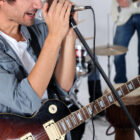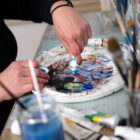In the Spotlight
National Indigenous People’s Day
May, 2022
Ryan Arcand remembers the vibe the last time National Indigenous People’s Day celebrations took place in front of a crowd in St. Albert.
“My fondest memory was seeing all the love and the laughter and camaraderie and just people having a great time and a great day. It was just absolutely beautiful.”
Ryan Arcand
That was back in 2019 at the city’s Lion’s Park, where dancers, singers and drummers in full ceremonial shared their ethnic heritages and spirituality to a throng of eager onlookers. Government directives issued during the pandemic the following year had since scuttled the live proceedings. But while variants of COVID-19 remain a going concern, organizer Marc Parent anticipates that this year’s celebrations will still be green-lit to take place Sunday, June 19.
“It’ll be a celebration like it was three years ago,” said Parent, the president of the St Albert National Aboriginal Day Celebration Society. “It’ll be a celebration of indigenous and non-indigenous people gathering together, sometimes otherwise they would never gather together.”
Parent was quick to point out that no other day on the calendar provides an opportunity to showcase an event that enables aboriginals to share space with other Canadians. And while the committee is still putting together the affair’s itinerary, he’s pretty confident that the event format will be relatively the same as in previous years.
Traditionally, the event starts at noon with the Grand Entry of 100 dignitaries, followed by speeches from prominent members of the indigenous community as well as politicians from the municipal, provincial and federal governments. The revelry kicks off almost immediately after with an array of entertainment that has previously included Inuit throat singers, First Nations drummers and dancers, and Metis musicians resonating across the park, while other participants engage patrons with activities from making dreamcatchers to telling stories about the healing gardens by the Sturgeon River.
While the roster might sound packed, the ceremonies stray from a regimented schedule.
“It’s kind of a different event because it’s very loosely structured,” he added. “One band might play a little longer, one might play a little shorter, that’s kind of the way things roll.”
Marc Parent, the president of the St Albert National Aboriginal Day Celebration Society.
Previously called National Aboriginal Day, National Indigenous People’s Day first became reality in 1996, when the federal government responded to a request by the Assembly of First Nations to set aside a national holiday to celebrate the accomplishments of its people. They selected June 21 as that day, but given that it’s only a statutory holiday in the Northwest Territories and the Yukon, indigenous organizations usually select an adjacent weekend for their festivities.
While the 2019 running of the event was the last before the onset of COVID-19, it also took place on the heels of the final report issued by the National Inquiry into Missing and Murdered Indigenous Women and Girls, a stern indictment of the systemic racism that led to the tragic fate of thousands of aboriginal women in Canada. A march commemorating those women is slated to take place from Lion’s Park before the National Indigenous People’s Day celebrations commence.
The indigenous community has also had to come to grips with the grisly discovery of the remains of nearly 1,000 aboriginal children buried on former residential school properties in B.C. and Saskatchewan in 2021 and the simultaneous torching of nearly 50 places of worship across the country, including St. Jean Baptiste Church in nearby Morinville.
Parent believes those incidents indicate that Canadians need to get together for a festive occasion to help all those affected get through those tough times. “It’s been so hard over the last two years, with the Morinville church burning down, and the finding of all those poor kids,” he said. “I just really feel like people just need to get together and dance and sing and drum and pick it up from there.”
Arcand, who won an Established Artist award at the Mayor’s Celebration of the Arts in April, believes sharing his culture serves to engage other Canadians by highlighting the more joyous side of indigenous people. “I don’t do it for me; I do it for them,” he said about his motives for entertaining audiences. “I help to show people this is who we are. Seeing the performers light up the eyes of so many people, and the smiles and the amount of love shows respect and honour from the entertainers.”
“Those are the people that we’re trying to reach,” added Parent. “We’re trying to give the Inuit, First Nations People, the Métis a safe place to celebrate. A safe place for everybody and turn it into a celebration.
- culture
- entertainer
- entertainment
- First Nations
- First Nations people
- food
- history
- indigenous
- inuit
- local
- Metis
- music













